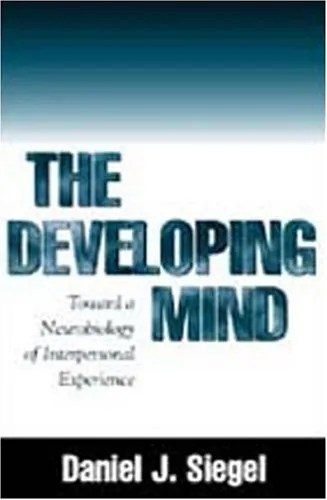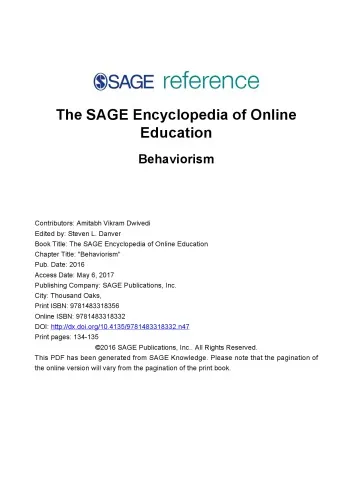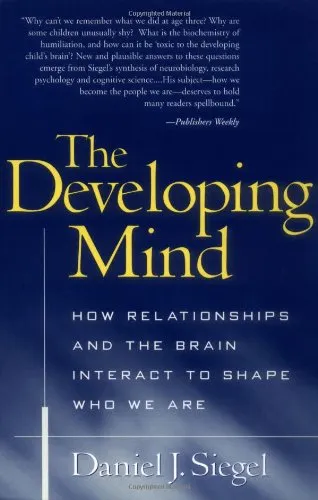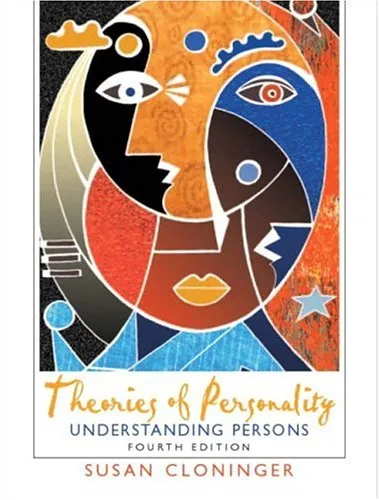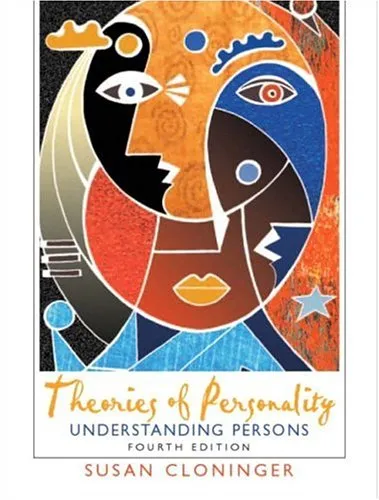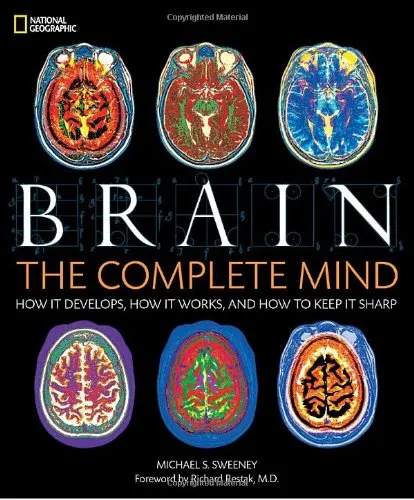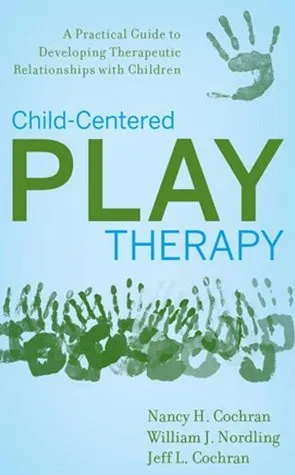The Developing Mind: Toward a Neurobiology of Interpersonal Experience
4.5
بر اساس نظر کاربران

شما میتونید سوالاتتون در باره کتاب رو از هوش مصنوعیش بعد از ورود بپرسید
هر دانلود یا پرسش از هوش مصنوعی 2 امتیاز لازم دارد، برای بدست آوردن امتیاز رایگان، به صفحه ی راهنمای امتیازات سر بزنید و یک سری کار ارزشمند انجام بدینکتاب های مرتبط:
معرفی کتاب: ذهن در حال توسعه: به سوی یک Neurobiology تجربه بینفردی
کتاب "ذهن در حال توسعه: به سوی یک Neurobiology تجربه بینفردی" نوشته دکتر دانیل جی. سیگل، اثری است که به بررسی عمق روابط انسانی و تأثیر آنها بر توسعه و عملکرد مغز انسان میپردازد. این کتاب یک سفر به دنیای پیچیده تعاملات انسان و تأثیرات آن بر روان و مغز است.
خلاصهای از کتاب
در "ذهن در حال توسعه"، دکتر سیگل پیوندهای بین رشتهای بین Neurobiology، روانشناسی و رابطههای انسانی را بررسی میکند. این کتاب تلاشی برای درک بهتر این موضوع است که چگونه حالتهای هیجانی و تعاملات اجتماعی میتوانند بر ساختارهای مغزی و عملکرد آنها تأثیرگذار باشند. سیگل با استفاده از تحقیقات گسترده و مطالعات موردی متعدد، توضیح میدهد که چگونه مغز و ذهن در کنار هم پیشرفت میکنند، به ویژه در بستر تعاملات بینفردی.
یکی از موضوعات اصلی این کتاب، مفهوم "integration" ذهنی است. سیگل توضیح میدهد که "integration" روانی و اجتماعی، نقشی کلیدی در سلامت کلی ذهن دارد. این کتاب به بررسی این میپردازد که چگونه "integration" یا یکپارچگی، عملکردهای مختلف مغز را هماهنگ میکند و تعادل روانی انسان را بهبود میبخشد. از طریق این دیدگاه، دکتر سیگل نشان میدهد که رشد و توسعه ذهن، نه تنها یک فرآیند بیولوژیکی بلکه یک تجربه اجتماعی و روانی است.
نکات کلیدی
- ارتباط مستقیم بین ارتباطات اجتماعی و تغییرات عصبی در مغز
- نقش مهم "attachment" و دلبستگی در توسعه روانی و عاطفی
- اهمیت "integration" ذهنی در جلوگیری از بروز اختلالات روانی
نقلقولهای مشهور از کتاب
هر رابطهای که داریم، داستانی را درباره مغزمان به ما میگوید.
ادراکات ما از واقعیت، نه تنها بر اساس تجربههای خودمان، بلکه با توجه به تعاملات بینفردیمان شکل میگیرد.
چرا این کتاب مهم است
کتاب "ذهن در حال توسعه" اهمیت ویژهای برای جامعه علمی و عمومی دارد. این کتاب به ارتقای فهم ما از چگونگی تعاملات انسانی و تأثیرات آن بر ساختار و عملکرد مغز کمک میکند. خواندن این اثر برای افرادی که در برنامههای روانشناسی، علوم اعصاب، آموزش و دیگر حوزههای اجتماعی فعالیت میکنند، بسیار مفید است. درک این روابط به ما کمک میکند که با دانش بهتر و عمیقتری به مسائل اجتماعی و روانی بنگریم و راهحلهای موثر و قابل اجرا ارائه دهیم.
Introduction to "The Developing Mind: Toward a Neurobiology of Interpersonal Experience"
Written by Daniel J. Siegel, "The Developing Mind: Toward a Neurobiology of Interpersonal Experience" offers an insightful exploration into how interpersonal relationships and brain development intertwine to shape the essence of our mental life. This seminal work presents a groundbreaking synthesis of the complex mechanisms involved in the fundamental processes of human life: our minds and our social world.
Detailed Summary of the Book
The core premise of "The Developing Mind" revolves around understanding the bridge between two seemingly distinct domains: the biological sciences of the brain and the psychological dynamics of personal relationships. Siegel introduces and elaborates on the concept of "interpersonal neurobiology," an interdisciplinary approach that emphasizes how social interactions are integral to building mental capacities and cognitive frameworks from a young age.
In the book, Siegel meticulously examines the synthesis of emerging insights from neuroscience, psychiatry, and developmental psychology. By dissecting how brain circuitry is initially constructed and continuously modified throughout life by social experience, he highlights the dynamic interplay of genetics and environment. Notably, the text underscores the idea that attachment experiences in early life have a significant impact on the maturation of brain structures and function.
Structured through a sequential method, the book covers essential topics such as emotion regulation, memory, and narrative construction, alongside how these areas are affected by interpersonal experiences. Siegel argues that a deeper understanding of these processes is essential for therapeutic practices and educational priorities alike.
Key Takeaways
- The mind's development is influenced significantly by interpersonal relationships, and these relationships require a neurobiological framework for full understanding.
- Integration within the brain and between people is essential for healthy development and psychological well-being.
- Early attachment experiences shape the brain's architecture, influencing lifelong emotional and mental functioning.
- Conscious efforts in relationships can lead to neuroplasticity, altering brain circuitry even in adulthood.
Famous Quotes from the Book
"At the most fundamental level, human connections are the building blocks of our lives."
"The mind emerges at the interface between human relationships and the unfolding structure and function of the brain."
Why This Book Matters
"The Developing Mind" matters significantly in today’s context as it challenges and reshapes conventional understanding of mental processes by emphasizing the importance of relationships in brain development. This book provides an integrated view of the human mind’s growth, one that spans across boundaries of disciplines, making it invaluable for a wide audience, including mental health professionals, educators, parents, and anyone interested in the intertwining fields of psychology and neuroscience.
Daniel J. Siegel’s work advocates for a more compassionate approach to personal relationships and offers insights into how fostering positive interactions can lead to healthier mindscapes. By presenting a new framework to understand how our minds develop and are affected by the people around us, this book is not only informative but transformative.
Overall, "The Developing Mind" is a powerful read that provides the conceptual tools needed to appreciate the depth of interaction between the developing brain and the social environments it encounters. Its relevance continues to resonate across diverse fields of study and practice well beyond its initial publication.
دانلود رایگان مستقیم
شما میتونید سوالاتتون در باره کتاب رو از هوش مصنوعیش بعد از ورود بپرسید
دسترسی به کتابها از طریق پلتفرمهای قانونی و کتابخانههای عمومی نه تنها از حقوق نویسندگان و ناشران حمایت میکند، بلکه به پایداری فرهنگ کتابخوانی نیز کمک میرساند. پیش از دانلود، لحظهای به بررسی این گزینهها فکر کنید.
این کتاب رو در پلتفرم های دیگه ببینید
WorldCat به شما کمک میکنه تا کتاب ها رو در کتابخانه های سراسر دنیا پیدا کنید
امتیازها، نظرات تخصصی و صحبت ها درباره کتاب را در Goodreads ببینید
کتابهای کمیاب یا دست دوم را در AbeBooks پیدا کنید و بخرید
1299
بازدید4.5
امتیاز0
نظر98%
رضایتنظرات:
4.5
بر اساس 0 نظر کاربران
Questions & Answers
Ask questions about this book or help others by answering
No questions yet. Be the first to ask!
